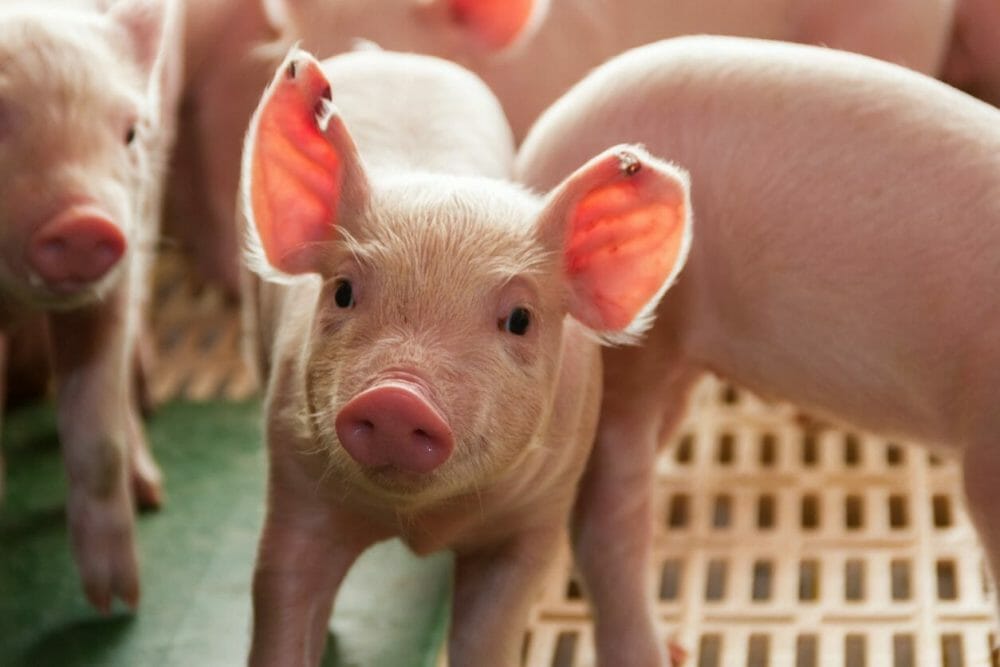For the last few months, China has been proving repeatedly that pigs can fly. As Reuters reported this Thursday, “six planes carrying more than 4,000 French breeding pigs have arrived in China so far this year, the first of dozens of expected plane-loads as the world’s top pork producer rebuilds its decimated hog herd.”
The cause of this decimation? The lethal and widening outbreak of African swine fever (ASF); mortality rates for pigs can reach up to 90% within weeks, and by the time symptoms like difficulty breathing, vomiting or red blotchy skin lesions start to show, it could have already spread through much of a farm’s herd. It has not, as yet, mutated to infect humans.
But these flying efforts to replenish herds in China, and other efforts to contain ASF’s further spread in pigs there and elsewhere, are now coming up against setbacks from Covid-19, the virus that’s affecting humans all over the world, bringing sweeping travel clampdowns, export restrictions, and economies to a standstill.
While Covid-19 affects only humans and ASF only affects wild and domesticated pigs, the strategies to contain these two pathogens both need easy, accurate and rapid testing. This is far from a reality for either at present. With Covid-19, there have already been various high-profile reports of error-prone testing kits, or some that are even contaminated with the disease. With ASF, countries like Australia are turning to sniffer dogs and 3D X-ray machines as part of its recent $66 million anti-ASF border package, a gesture that could well go further in light of ASF reaching Papua New Guinea this month.
Testing times for testing technology
Fortunately, there is raft of tech on the horizon to mitigate the effects and spread of ASF, as I discovered during my research trip last year in Singapore; and there seem to be a few more snippets of hope to add to that earlier roundup. Among various recent breakthroughs in the steps toward commercializing an eventual vaccine, there are new and easier ways to test at borders and on the farm in the pipeline. The developer of molecular diagnostic systems MatMaCorp, for example, told AFN that it has successfully evaluated a genetic test to detect African swine fever in uncooked pork products.
Raw pork products, the team claims, are a common way the virus is spread. But the difficulty is that these products, if safe, need to get to market rather than sit around for days at a border checkpoint or in a processing plant waiting for samples to be sent to a lab, and for eventual results to be generated and sent back. So MatMaCorp has designed a hand-held device that’s basic, quick and “user-friendly” so as to be equally accessible for an untrained border guard or farmer as it would be for veterinarians in lab coats. It also negates needing large laboratory equipment like centrifuges, pipettes, and refrigerators.
“You could throw it in the back of a pickup truck, and it would still work,” said CEO Phil Kozera, speaking to AFN by phone. MatMaCorp’s customizable platform is designed to quickly analyze genetic information, including single nucleotide polymorphisms (SNPs) from any biological sample, at any location. The platform includes a simple DNA/RNA isolation kit and a custom assay that is run on a small, portable device. MatMaCorp’s platform and test for ASF is cost-effective and easy to use, the company claims, because it does not require extensive laboratory equipment and skills and can deliver results on-site within hours.
Could this sort of technology be quickly pivoted to test for other viruses, like Covid-19?
“Because of our comfort level on RNA viruses, it’s certainly an area that we could take a further look at, as our system is designed to be rapidly deployable at the point of use,” replied Kozera. Though he noted that the scale of the threat from viruses ASF is a huge enough challenge for one early-stage company from Nebraska. According to the Swine Disease Global Surveillance Project, the disease could cause up to $10 billion in economic damages within a year if the disease reached the United States. While ASF has already devastated pig populations from Vietnam to Poland, it has so far been kept out of the US, which is the world’s largest pork exporter and raises more than 115 million hogs a year in an industry valued at $24 billion annually.
Border biocontrol
That is why the federal government has taken a close interest in companies like MatMaCorp. The latest evaluation was done as part of a US Department of Homeland Security (DHS) Science and Technology (S&T) Directorate program to identify new technologies that secure the US food supply and monitor food imports and exports.
What has made the spread of ASF loom so large at the border, reckoned MatMaCorp founder and president Dr. Abe Oommen, is that containment systems have to be in place before it is too late. “It is a highly contagious disease,” wrote Oommen, in a socially-distant emailed note. “Like coronavirus (an example everyone seems to understand), if you do not have a system in place to contain the spread of the virus, it is going to spread. With monitoring, you can know how and where the disease is spreading. When a disease is very contagious, time is of the essence.”
He warned that previously there had been no way to monitor in the field and in processing plants and urged governments to share information with farmers and vice versa. “Transparency, trust and confidence have to be established between all stakeholders,” he implored. “If information is not shared between private companies and government agencies that are trying to protect the nation, then it is hard to contain any infectious agent.”
Herd virality
Officials, farmers and veterinarians are of course not just keen to track ASF through raw pork. Other companies offering ASF testing kits, like the Silver Lake Research Corporation, are working on testing a pig while it is still alive and could still be quarantined from the rest of the herd, potentially saving thousands from being culled, burnt and buried. The company has developed a testing kit called PenCheck, with results apparently available within 20 minutes — so no waiting around while the disease travels through the farm. Its method needs a drop of blood from the pig or boar along with a few drops of water, and “was designed with a simple protocol, such that screening may be accomplished confidently in any environment.” At Kansas State University, Dr. Juergen Richt conducted a validation study to determine its accuracy. The team informs AFN that sensitivity came to 95.5%, with a specificity of 99.3%. In the sensitivity tests, “PenCheck correctly identified 21 of 22 pigs with moderate to severe symptoms of African swine fever. In the specificity tests, PenCheck was found to be very dependable. In 144 pigs with no prior symptoms, PenCheck correctly determined 143 pigs did not carry the virus.”
When travel restrictions someday ease for Covid-19, they could well remain tight for pigs flying in planes across borders. So tests like these could be what border officials need to prove their new arrivals are not touching down with ASF.





